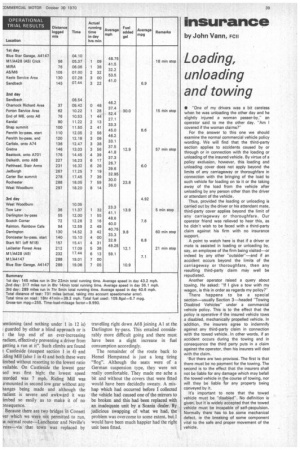Loading, unloading and towing
Page 41

If you've noticed an error in this article please click here to report it so we can fix it.
• "One of my drivers was a bit careless when he was unloading the other day and he slightly injured a woman passer-by," an operator said to me the other day. "Am I covered if the woman claims?"
For the answer to this one we should examine the normal commercial vehicle policy wording. We will find that the third-party section applies to accidents caused by or through or in connection with the loading or unloading of the insured vehicle. By virtue of a policy exclusion, however, this loading and unloading cover does not apply beyond the limits of any carriageway or thoroughfare in connection with the bringing of the load to such vehicle for loading on to it or the taking away of the load from the vehicle after unloading by any person other than the driver or attendant of the vehicle.
Thus, provided the loading or unloading is carried out by the driver or his attendant mate, third-party cover applies beyond the limit of any carriageway or thoroughfare. Our operator friend was relieved to hear this, as he didn't wish to be faced with a third-party claim against his firm with no insurance Support.
A point to watch here is that if a driver or mate is assisted in loading or unloading by, say, an employee of the firm being visited-or indeed by any other "outsider" and if an accident occurs beyond the limits of the carriageway or thoroughfare, then any resulting third-party claim may well be repudiated.
Another operator raised a query about towing. He asked: "If I give a tow with my wagon, is this in order as regards my policy?"
There happens to be a special section-usually Section 3-headed "Towing Disabled Vehicles" under a commercial vehicle policy. This is to the effect that the policy is operative if the insured vehicle tows a disabled, mechanically propelled vehicle. In -addition, the insurers agree to indemnify against any third-party claim in connection with the towed vehicle. In other words, if an accident occurs during the towing and in consequence the third party puts in a claim against the operator, then his insurers will deal with the claim.
'But there are two provisos. The first is that there must be no payment for the towing. The second is to the effect that the insurers shall not be liable for any damage which may befall the towed vehicle in the course of towing, nor will they be liable for any property being conveyed by it.
It's important to note that the towed vehicle must be "disabled". No definition is given, but it is widely accepted that the towed vehicle must be incapable of self-propulsion, Normally there has to be some mechanical defect, ie the breaking of some component vital to the safe and proper movement of the vehicle.








































































































